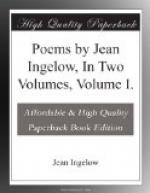“Then,” quoth he, “I may do what
best I like;
It makes no matter. Goody, you were wise
To help me in it, and to let me farm;
I think of getting into mischief else!”
“No! do ye, laddie?” quoth the dame, and
laughed.
“But ask my grandfather,” the youth went
on,
“To let me have the farm he bought last year,
The little one, to manage. I like land;
I want some.” And she, womanlike, gave
way
Convinced; and promised, and made good her word,
And that same night upon the matter spoke,
In presence of the father and the son.
“Roger,” quoth she, “our Laurance
wants to farm;
I think he might do worse.” The father
sat
Mute but right glad. The grandson breaking in
Set all his wish and his ambition forth;
But cunningly the old man hid his joy,
And made conditions with a faint demur.
Then pausing, “Let your father speak,”
quoth he;
“I am content if he is”: at his word
The parson took him, ay, and, parson like,
Put a religious meaning in the work,
Man’s earliest work, and wished his son God
speed.
II.
Thus all were satisfied, and day by day,
For two sweet years a happy course was theirs;
Happy, but yet the fortunate, the young
Loved, and much cared-for, entered on his strife,—
A stirring of the heart, a quickening keen
Of sight and hearing to the delicate
Beauty and music of an altered world;
Began to walk in that mysterious light
Which doth reveal and yet transform; which gives
Destiny, sorrow, youth, and death, and life,
Intenser meaning; in disquieting
Lifts up; a shining light: men call it Love.
Fair, modest eyes had she, the girl he loved;
A silent creature, thoughtful, grave, sincere.
She never turned from him with sweet caprice,
Nor changing moved his soul to troublous hope,
Nor dropped for him her heavy lashes low,
But excellent in youthful grace came up;
And ere his words were ready, passing on,
Had left him all a-tremble; yet made sure
That by her own true will, and fixed intent,
She held him thus remote. Therefore, albeit
He knew she did not love him, yet so long
As of a rival unaware, he dwelt
All in the present, without fear, or hope,
Enthralled and whelmed in the deep sea of love,
And could not get his head above its wave
To reach the far horizon, or to mark
Whereto it drifted him.
So
long, so long;
Then, on a sudden, came the ruthless fate,
Showed him a bitter truth, and brought him bale
All in the tolling out of noon.
’Twas
thus:
Snow-time was come; it had been snowing hard;
Across the churchyard path he walked; the clock
Began to strike, and, as he passed the porch,
Half turning, through a sense that came to him
As of some presence in it, he beheld




